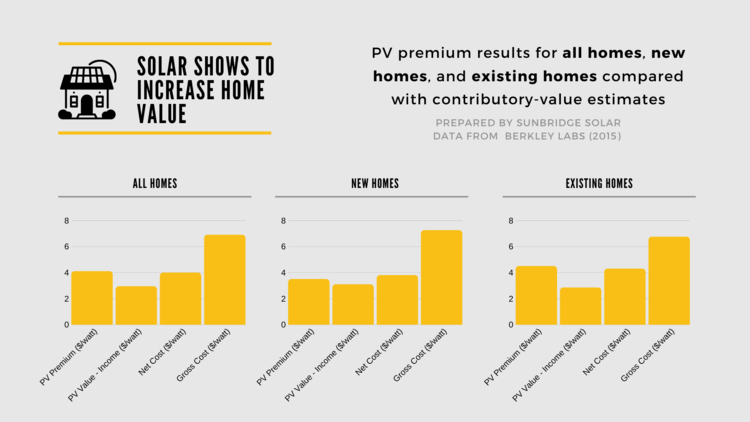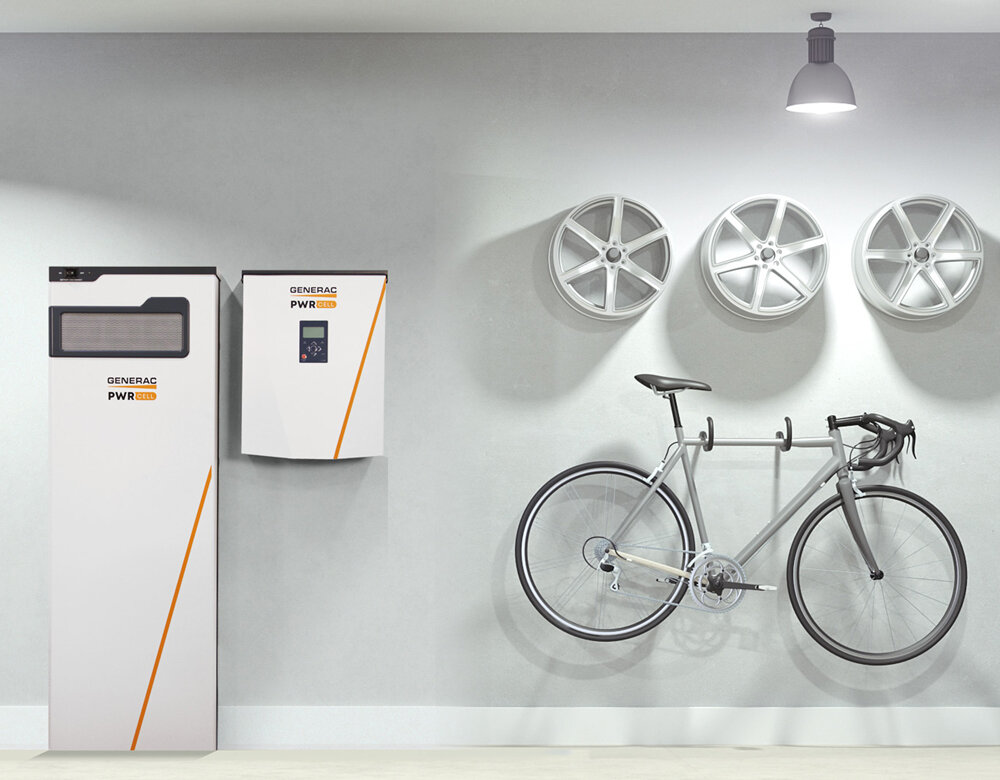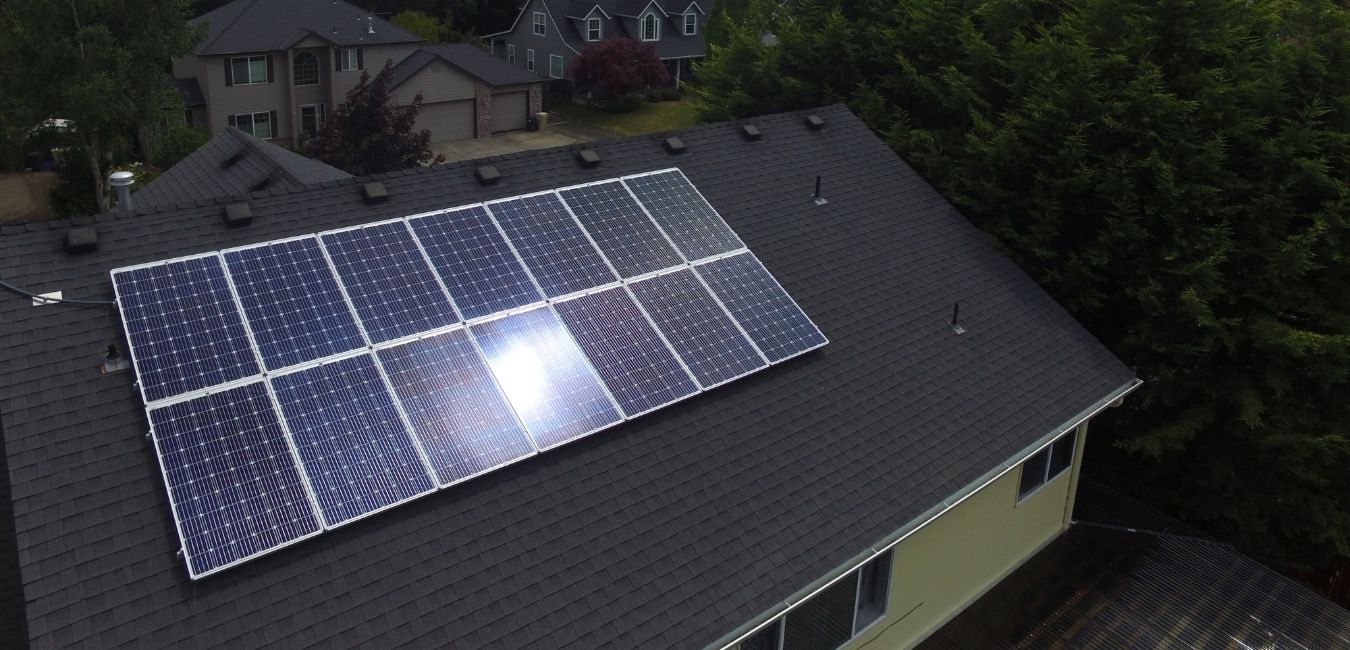Solar is Proven to Increase Home Values
Studies by National Renewable Energy Laboratory at Berkley Labs’ Electric Markets and Policy have shown that home buyers are consistently willing to pay premiums for houses with existing PV systems, even across multiple states, years, and home types. On average, buyers are willing to pay nearly $15,000 more for a home with an average-sized solar energy system than for a home without solar energy.
Solar Adds Value And This Is Why
Although the exact amount added by solar energy systems varies, on average you can expect a $3,000-$4,000 increase in sales price per kilowatt of solar panels. Since most residential solar arrays are between 3 and 5 kilowatts, that’s anywhere from $12,000-$20,000 in value.
This means that you can easily recoup the costs of installing a solar energy system when you sell the home, after already reaping the benefits of the solar energy system for however long you lived there after installation. Plus, with so many federal and state incentives and tax breaks related to solar energy, you may be able to significantly reduce your upfront installation costs.

Graph showing the difference in value solar adds to all homes, new homes, and existing homes. Data provided by Berkeley Labs’ “Selling Into the Sun: Price Premium Analysis of a Multi-State Dataset of Solar Homes.”
3.74% Higher Selling Price
Ultimately, a solar-equipped home generally has a 3.74% higher selling price than similar properties that do not have solar energy. Buyers know that they will pay less in energy costs in the long run so they are willing to pay the premium upfront, and they don’t have to do any of the work of permitting or installing the solar energy system. It is essentially viewed as an upgrade for a home, much like a recent interior renovation.
A Home For The Eco-Conscious
Buyers will be able to feel good about purchasing a home with solar because it not only benefits them financially in the long run, but it also benefits the environment since it is a renewable green energy source. Environmentally-conscious buyers will be more motivated to make an agreeable offer on a home that aligns with their values.
Local Factors
However, the exact added market value of a solar energy system varies based on several factors, including things like region (which dictates the local price of electricity, the level of local understanding of solar technology and benefits, the level of local environmental consciousness, frequency of power outages, and state solar incentives) and the current value of the solar system itself. Which depends on the price of the original installation, the system replacement value, the age of the system, the amount of energy generation, and so forth.
Obviously, the newer the solar energy system, the more it’s worth in terms of resale value.
Solar is a twofold value because not only are newer solar panels made of more efficient materials so you are getting more bang for your buck and more energy per panel, but also the warranty will have more years left on it and potential buyers aren’t as likely to have to replace costly components soon after buying the home. This becomes a trifold value if the home has a pre-existing home battery backup system, such as the Tesla Powerwall or Generac PWRCell.

The Devil Is In The Details
While you are likely to get a higher price when selling your solar-equipped home, there are some caveats to the process to consider.
Homes With Solar Panels May Take Longer To Sell
On average, solar-equipped homes spend about 8 more days on the market when compared to similar homes that do not have solar. However, that is a national average, and the comparison varies quite a bit state to state. There are several possible reasons for this.
First of all, not all states have enough solar-equipped homes to provide an adequate sample size, which could skew the statistics away from the national average.
Perception Of Solar Matters
As we alluded to above, the local perception of solar energy has a huge impact as well. For instance, in very sunny states where solar is more highly incentivized by state governments, it is often more broadly accepted and looked upon favorably, whereas in states that are overall less familiar with the technology and potential benefits, people tend to be more hesitant to invest in solar.
People in these states may not understand the long-term benefits or have doubts about the reliability and efficiency of solar energy, or perhaps electricity is cheap and solar is not well-incentivized in their area and they can’t justify the initial expense of installing solar panels.
In fact, some people may even be under the impression that the installation of a solar energy system means that they will be totally off the grid and 100% reliant on their solar system for energy, which overwhelmingly is not the case. The vast majority of solar-equipped homes are still grid-tied and therefore have very reliable electricity.
Do Larger PV Installations Increase Home Value More?
Sadly, the answer to this question is that larger PV installations will increase the home value only marginally more than small PV installations. Basically, environmentally conscious buyers who are in the market for a solar-equipped home are willing to pay a premium for the distinction of having solar energy, but that premium does not increase proportionally to the size and energy output levels of the solar energy system.
In light of this information, if you are considering installing a solar energy system on your home with eventual plans to sell it, you may want to install a modestly sized grid-tied system that allows you to rely on solar energy for most of the year, but still uses grid energy during the heaviest usage periods. That way, you keep your installation costs reasonable, benefit from free renewable energy for most of the year, and you can still list your home as solar-equipped to earn a premium when you sell it.
Incentives
There is a federal solar tax credit that applies throughout the country and there are also incentives at the state level that can have a huge impact on the upfront cost and annual tax breaks.
Check the incentives that your state offers to see if there are long-term incentives that you can leverage when selling your home. For instance, some states offer property tax breaks on solar-equipped homes, which will benefit the buyer year after year. If your state does not offer any types of long-term incentives for owning a solar home, your property may take longer and be harder to sell.

Oregon Solar Incentives
Learn More >>

Washington State Solar Incentives
Learn More >>


